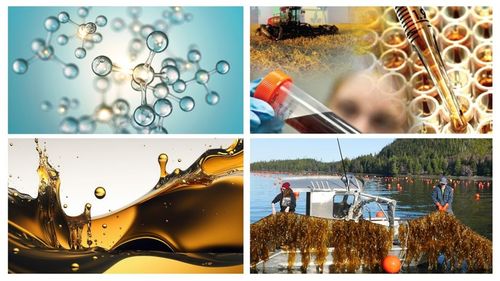DOE issues notice of intent to fund research and development to advance biofuels and bioproducts

Images from Adobe Stock, iStock.com, NOAA Fisheries, and U.S. Department of Energy
December 20, 2024
BY U.S. Department of Energy
The U.S. Department of Energy’s Bioenergy Technologies Office (BETO) on Dec. 16 announced their intent to issue funding to support high-impact research and development (R&D) projects in two priority areas: sustainable propane and renewable chemicals and algal system cultivation and preprocessing.
The U.S. Department of Energy’s Bioenergy Technologies Office (BETO) today announced their intent to issue funding to support high-impact research and development (R&D) projects in two priority areas: sustainable propane and renewable chemicals and algal system cultivation and preprocessing. The intended Sustainable Propane and Renewable Chemicals (SPARC) funding opportunity would support R&D of domestic chemicals and fuels from biomass and waste resources to help secure domestic supply chains, support the growth of rural economies, and grow the nation’s competitiveness in biotechnology and biomanufacturing industry. The intended Maximizing Algal System Yield (MASY) funding opportunity would support applied algal system R&D to improve the affordable production of biofuels and bioproducts.
Sustainable Propane and Renewable Chemicals Funding Opportunity
Advertisement
The United States is the world’s second largest chemicals producer. The chemical sector is also critical to domestic manufacturing, with more than 96% of U.S. goods manufactured using products from the chemical sector, and to the U.S. workforce, with the chemical industry directly employing over half a million people. In addition, 4.2% of U.S. households and 7.8% of Midwest homes use propane or liquid petroleum gas (LPG) as their primary heating fuel, with rural households using 80% of all domestic propane consumption. Producing chemicals and propane/LPG from domestic renewable feedstock resources could help fortify domestic supply chains, advance the sustainability of the industry by increasing energy efficiency and reducing greenhouse gas emissions, and ultimately, result in lower energy costs for householders.
The SPARC notice of funding opportunity (NOFO) is expected to be released in January 2025, and could include up to $23 million in federal funding for the following topic areas:
- Topic Area 1: Biobased Chemicals
- Topic Area 2: Biobased Propane/LPG
Maximizing Algal System Yield Funding Opportunity
Advertisement
R&D on advanced algal systems presents an opportunity to sustainably expand biomass resource potential in the United States. Algae, an abundant and renewable biofuel source, have unique properties that can be converted to produce biofuels and bioproducts reducing net emissions from domestic transportation and industry. While algal systems can be highly productive, there are technical barriers that limit the expansion of algae as a domestic bioenergy feedstock. The MASY funding opportunity will address these challenges by focusing on algal system cultivation and preprocessing R&D to advance affordable and reliable development of innovative algae technologies that can support algae developers bring these new bioproducts to market. The potential MASY NOFO could include up to $10 million in federal funding and is expected to be released in January 2025.
The two planned funding opportunities support government-wide targets of DOE’s Clean Fuels and Products Shot™ and Sustainable Aviation Fuel Grand Challenge. They also align with BETO’s strategic goals to produce fuels and chemicals from domestic biomass resources and to advance algal systems that will grow domestic energy supply chains, expand access to renewable feedstocks, and support the U.S. bioeconomy.
BETO envisions awarding multiple financial assistance awards for R&D activities for each of the SPARC and MASY NOFOs in the form of cooperative agreements, lasting approximately three years. Learn more about applicant eligibility and registration requirements.
Related Stories
President Trump on July 4 signed the “One Big Beautiful Bill Act.” The legislation extends and updates the 45Z credit and revives a tax credit benefiting small biodiesel producers but repeals several other bioenergy-related tax incentives.
CARB on June 27 announced amendments to the state’s LCFS regulations will take effect beginning on July 1. The amended regulations were approved by the agency in November 2024, but implementation was delayed due to regulatory clarity issues.
SAF Magazine and the Commercial Aviation Alternative Fuels Initiative announced the preliminary agenda for the North American SAF Conference and Expo, being held Sept. 22-24 at the Minneapolis Convention Center in Minneapolis, Minnesota.
Saipem has been awarded an EPC contract by Enilive for the expansion of the company’s biorefinery in Porto Marghera, near Venice. The project will boost total nameplate capacity and enable the production of SAF.
Global digital shipbuilder Incat Crowther announced on June 11 the company has been commissioned by Los Angeles operator Catalina Express to design a new low-emission, renewable diesel-powered passenger ferry.
Upcoming Events










